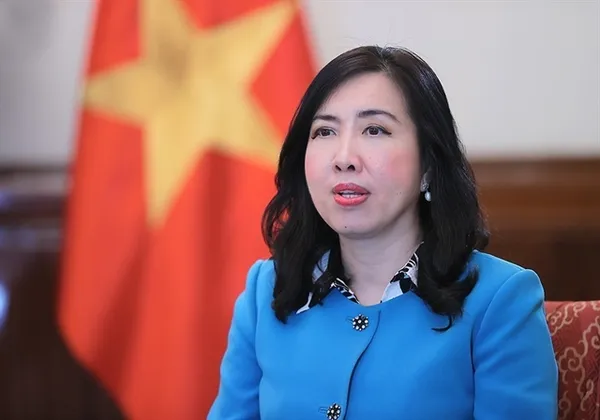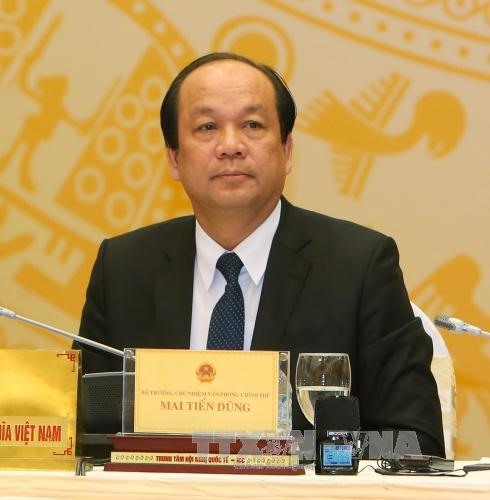 Opinion
Opinion

To mark the onset of the New Year, Minister and Government Office Chief Mai Tiến Dũng speaks to the media about the government’s resolve to work by the principles of "integrity, actions and development".
 |
| Minister and Government Office Chief Mai Tiến Dũng. |
To mark the onset of the New Year, Minister and Government Office Chief Mai Tiến Dũng speaks to the media about the government’s resolve to work by the principles of "integrity, actions and development".
Will you please further elaborate on a report saying that the government’s two biggest successes in 2016 were the people’s confidence in the market and in the society?
Speaking in a recent online conference between the Government and leaders from 63 cities and provinces nation-wide, Prime Minister Nguyễn Xuân Phúc stressed that successes recorded in 2016 were of great importance, yet they were not up to expectation.
“Many things could have been done better”, he said. Phúc urged all government cabinets and leaders from echelons nationwide to work harder to create change.
The PM then spoke about 30 missions that all ministries and localities must implement in 2017.
In 2016, the government did quite a lot of good things for the people and for enterprises, yet there remain many things to be done to meet their expectations.
The new government has been in operation just more than eight months. Its slogan is “a government of integrity, actions and development”. To turn this slogan into reality, of course, it will take time. I’m sure it cannot be done in one or two years. For example, more recently the PM told provincial leaders that they should not pay a New Year visit to him or to his subordinates. What the PM said was “an order” for the upcoming Lunar New Year (in late January and early February) and for following years.
To create any change, we need time and great determination. I’m confident that if our thoughts are clear, we’ll be able to create a new change, a change for the better, from the Central Government to local governments.
If we want to turn the present administrative system into a “moving” system, we need workable measures that offer tools for the administrative system - from its center down to the grassroots level - to work in chain.
Immediately following the end of the 2nd National Assembly meeting last November, Phúc ordered the Ministry of Home Affairs to draft a Government Decree on the Culture of Resignation. A key message in the decree is that those who are in power that fail to perform their duties must resign. The culture of resignation will create a continuous change in each office/organisation or unit. I’m confident that high spirits and a fast-moving environment adopted by the head of an office/organisation will become a locomotive pulling his/her administrative machine into a motion.
The PM has appointed you as the head of that working team. Will you please tell us a bit more about the role and activities of that team?
The team was conceived by the PM. The key mission of the team is to monitor how well ministries and sectors to carry out their assigned missions. The PM assigned me to the position as the Minister and Chairman of the Government Office. Members of the Office include Deputy Ministers from the ,inistries of Finance, Planning and Investment, Home Affairs, Government Inspections and others. The key mission of the working team is to constantly update the PM on the implementation of missions assigned by the PM and the Government to line ministries and localities nationwide.
The working team was established in late August 2016. I should say that since its inception, the team has noted positive changes in all ministries and localities.
During the past eight months, over 10,000 tasks were assigned to all ministries and localities, and about 97 per cent of them had been accomplished. This is an indication of the great determination of the ministries and localities in carrying out the missions assigned to them by the PM.
Do you face any pressure in the position as the head of the working team?
Of course, there are some pressures. One of them is maintaining an elevated accountability and transparency principle. After each mission, I often debrief media workers about what we have done. By now I should say this is the right way to inform the public about government’s activities. This is totally in line with the PM’s instructions.
The other pressure I should mention is that during our inspection visit, I don’t wear the hat as the Minister, but the chief of the inspection team.
Of course, before conducting any mission, I always present my ideas to the PM and ask for his advice.
I always tell other team members “we’re in a team, we have to work together.” That’s why during the missions, we all consider ourselves as inspectors – not Ministers or high ranking government officials.
Our working team meets once every month to review the situation and then select topic for the next inspection mission and decide where to go. Of course, following each meeting I have to report the meeting results to the PM and ask for his comments or advice.
As the head of an inspection team, have you faced any challenges?
Of course! My living principle is “Live and work with my own conscience”. As a government official, I have to perform my assigned duties to my best. I always tell myself and my colleagues that “we all work for the development of the nation. Stability is the prerequisite for development – not our final goal”. That’s why during the performance of my duties, I always try to do my best and be a good citizen as well as a loyal civil servant to the homeland. — VNS




